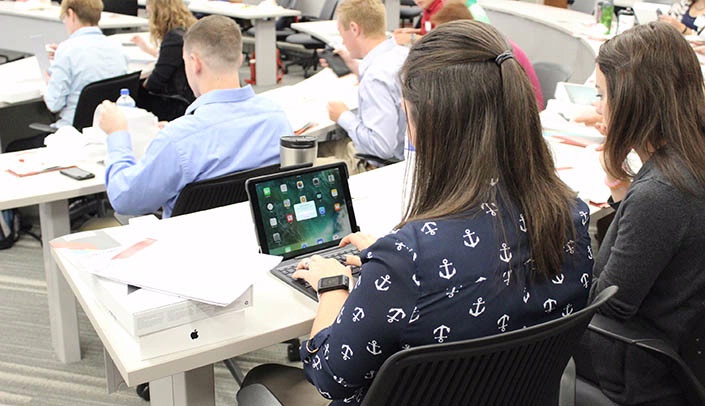As they arrived for the 2017-18 school year, Pharm.D. students at the UNMC College of Pharmacy received college-issued iPad Pros — brand-new, tablet-style handheld computers.
Cool, right? But, these devices are more than a mere perk.
“This is an important milestone in our continuing efforts to enhance teaching effectiveness,” said Dean Courtney Fletcher, Pharm.D. “It sets the stage for future innovations in active classroom learning, student-designed learning, simulation, and patient care.”
When UNMC launched its Digital Campus Initiative, the College of Pharmacy leapt into the challenge head-on. Dr. Fletcher, in March 2015, formed and charged an education, engagement and enhancement (3E) committee to “transform the way our faculty engage professional pharmacy students in the classroom to enhance teaching effectiveness.”
With the college moving into its new UNMC Center for Drug Discovery and Lozier Center for Pharmacy Sciences and Education facility in 2016, the timing was perfect. In March 2016, the 3E committee submitted its final report, and as pharmacy reported for the new school year that August, its education program went “paperless.” No more printed handouts or slides.
Now, pharmacy students will take notes and tests on their new iPad Pros. The tablets will have, for example, pharmacotherapy books and wellness apps on them selected and continuously reviewed and updated by a committee of faculty, staff and students
The devices were paid for through a reallocation of existing technology fees.
The iPads are fully integrated into pharmacy’s curriculum in part because its faculty has gone all-in. The college and the 3E committee sought faculty input throughout the process, and early adopters participated in training opportunities.
“We are fortunate to have strong campus support by UNMC and the chancellor,” said Gary Yee, Pharm.D., professor and associate dean for academic affairs. “Our initiative coincides with development of campuswide initiatives, like Apple training, and increased educational support, like the E-learning initiative and the Interprofessional Academy of Educators.”
Additionally, the college brought in leaders from the University of North Carolina Eshelman School of Pharmacy for a workshop on curricular transformation.
This past summer almost 40 percent of full-time pharmacy faculty enrolled in a campuswide Building Digital Curriculum training series.
“Change is always difficult,” Dr. Yee said. “But we are encouraged by the interest demonstrated by faculty to transform the way they teach and to learn and adopt new tools to engage students.”
Said Dr. Fletcher: “This reflects a commitment of our faculty, staff and students to be innovative and try something new.”
